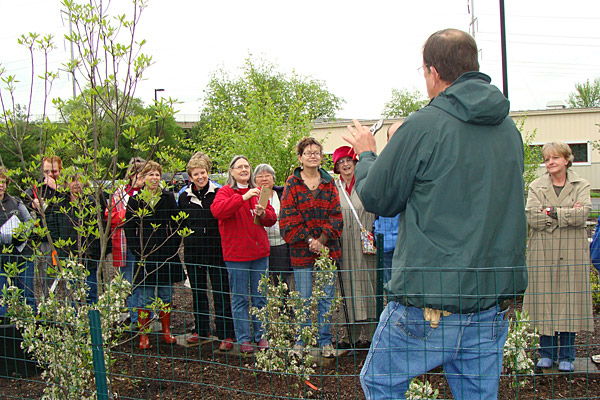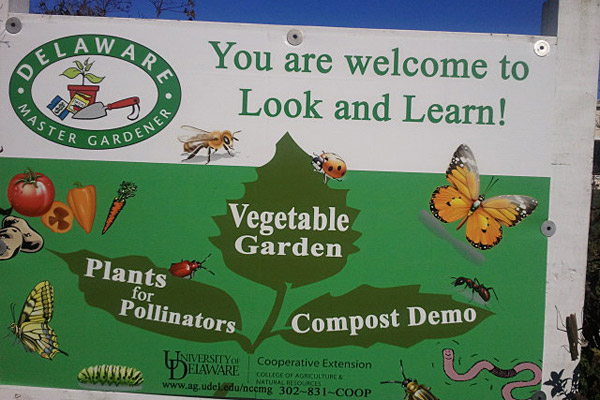Food source
Master Gardeners see increased demand for vegetable workshops
11:05 a.m., Feb. 28, 2012--From the time he was a young boy, Clyde Roberts grew tomatoes, cantaloupes and other produce on his family’s farm in Kansas. He earned agronomy degrees at Kansas State and Cornell and worked for DuPont Ag Products. Since retirement, the Hockessin resident has been a UD Master Gardener, teaching vegetable workshops and other gardening classes.
Roberts has long and deep ties to agriculture but he meets other Delawareans who are disconnected from their food source. They know they can find the first tender asparagus of spring at the supermarket but they aren’t quite sure how it got there.
Campus Stories
From graduates, faculty
Doctoral hooding
“In our beginner vegetable gardening workshop, I’ve had people who were surprised to find out that carrots and potatoes grow underground,” says Roberts. “They assumed that every vegetable grows on a bush, like tomatoes.”
Roberts is delighted to help the rank beginner as well the more experienced gardener learn the ins and outs of growing their own vegetables and fruits. The only problem he and other Master Gardeners have is keeping up with the demand.
“There has been a surge in interest in vegetable gardening workshops in the last four or five years,” says Carrie Murphy, the horticulture agent for New Castle County Cooperative Extension.
Delawareans aren’t the only ones getting excited about growing their own produce. Nationally, vegetable gardening is on the rise, according to the National Gardening Association, which attributes the trend to rising food prices and health-conscious consumers.
In 2011, an estimated one in three American households grew vegetables, whether that meant a solitary tomato plant on a deck or a large garden, such as Roberts’ five plots, where he harvests veggies from April (radishes and lettuce) until the first frost (bell peppers and tomatoes).
Edibles take center stage in the New Castle County Master Gardener spring workshop series, which kicks off March 6. While you’ll still be able to learn about such topics as pruning and ornamental container gardening, more than half of the classes are devoted to some aspect of vegetable gardening.
“For the third year in a row we’ll have separate classes for novice and experienced gardeners,” says Murphy. “We’re also offering specialized sessions, such as a workshop devoted exclusively to growing tomatoes and another on growing vegetables in containers.”
Classes get underway in less than two weeks and continue through May. Half of the workshops are in March, when gardeners are finalizing their plans, and in the case of some crops, starting to plant.
In Sussex County, spring Master Gardener classes began last Tuesday and continue through late June. Edibles take center stage in several workshops, including Feb. 28, when Darrell Hager explained how to use the web and software to plan and design a vegetable garden. Grape growing will be the focus of a workshop on March 21.
Roberts will teach a tomato class on April 5 that was created last year due to popular demand. Tomatoes top the list of the most commonly homegrown vegetables (even though technically they’re a fruit). But they’re not always easy to grow, especially the heirloom varieties.
“Heirlooms are all the rage but they’re more challenging,” says Roberts. Heirlooms aren't disease-resistant, like most hybrids, and they’re more susceptible to cracking and bruising.
“I encourage brand-new gardeners to grow half of their plot with heirlooms and half with hybrid varieties,” says Roberts. “I don’t want new gardeners to give up and get discouraged if they have a crop failure.”
A great way to solve problems before crop failure happens is to attend a Garden Day, held in the Master Gardeners’ Native Teaching Garden on the second and fourth Wednesday from April through September.
From 9 a.m. to noon on these days, Master Gardeners work in the garden, all the while explaining what they’re doing - from scouting for pests to the right way to weed. They’re happy to answer specific gardening questions, too.
Roberts doesn’t contend with crop failure often; instead he usually has an overabundance of veggies. If your harvest is equally successful, do what Roberts does and donate the excess to the needy.
The Master Gardeners participate in Plant a Row for the Hungry, a national program that encourages gardeners to plant an extra row at the beginning of the season and donate this produce to a local food bank. The Food Bank of Delaware is always in need of fresh produce to supplement the canned and packaged foods it receives.
Check out the spring Master Gardener workshops online. New Castle County classes can be found at this website or by calling 302-831-COOP.
For information on Sussex workshops, go to this website or call 302-856-7303.
Article by Margo McDonough
Photos by Danielle Quigley












